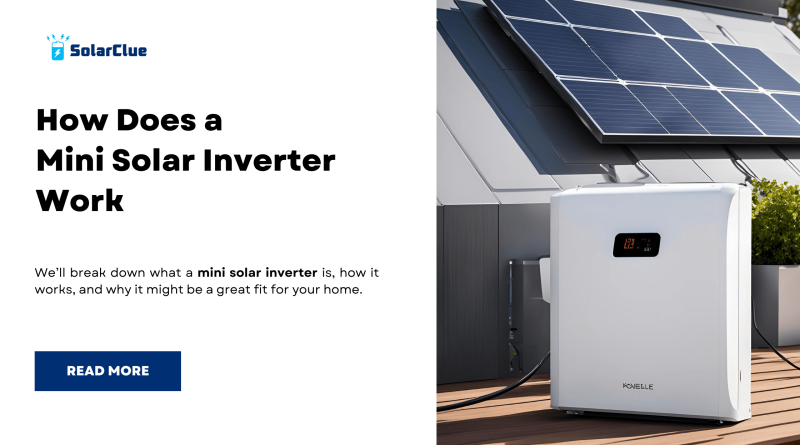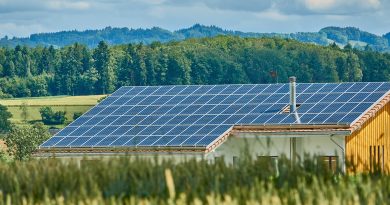Mini Solar Inverter
When it comes to making your home more energy-efficient, solar power is a fantastic option. But if you’re new to solar energy, you might be wondering about the components you’ll need, including something called a mini solar inverter. Don’t let the term intimidate you! In this guide, we’ll break down what a mini solar inverter is, how it works, and why it might be a great fit for your home.
Table of Contents
What is a Mini Solar Inverter?
A mini solar inverter is a compact device that converts the direct current (DC) electricity generated by solar panels into alternating current (AC) electricity, which is what most household appliances use. Think of it as the bridge between the solar panels and your home’s electrical system.
In traditional solar systems, a single, larger inverter often handles the job for all the solar panels. However, a mini solar inverter, also known as a microinverter, works on a smaller scale. It’s designed to be installed on each solar panel individually. This approach offers several benefits, especially for smaller solar setups or situations where space is a concern.
How Does a Mini Solar Inverter Work?
Imagine your solar panels are like little power stations. Each panel generates DC electricity when sunlight hits it. However, your home runs on AC electricity. The mini solar inverter’s job is to convert the DC power from each panel into AC power that can be used by your home.
Here’s a simple breakdown of the process:
- Solar Panels Collect Sunlight: Each panel absorbs sunlight and generates DC electricity.
- Mini Solar Inverter Converts Power: The mini solar inverter attached to each panel converts the DC power into AC power.
- Power Flows to Your Home: The AC power is then sent to your home’s electrical system, where it can be used to run appliances, lights, and other devices.
Advantages of Mini Solar Inverters
- Increased Efficiency: Since each mini solar inverter works independently, if one panel is shaded or not performing well, it doesn’t affect the performance of the others. This can lead to a more efficient system overall.
- Flexibility in Installation: Mini solar inverters can be easier to install in complex or small spaces. They’re often a good choice for rooftops with different orientations or angles.
- Simplified Maintenance: With mini solar inverters, you can monitor the performance of each panel individually. This makes it easier to spot and address issues quickly.
Disadvantages to Consider
- Higher Initial Cost: Mini solar inverters can be more expensive to purchase and install compared to a single, larger inverter.
- Complexity in System Design: While they offer flexibility, the installation of multiple mini inverters can be more complex compared to a single inverter system.
Choosing the Right Mini Solar Inverter
When selecting a mini solar inverter, consider factors like the size of your solar system, your budget, and the specific needs of your home. It’s a good idea to consult with a solar professional who can help you choose the right equipment and design a system that works best for you.
Comparison Table
Here’s a quick comparison of mini solar inverters vs. traditional inverters to help you understand the differences:
| Feature | Mini Solar Inverter | Traditional Inverter |
|---|---|---|
| Installation | On each panel | One central location |
| Efficiency | High (independent panel operation) | Can be affected by shading |
| Cost | Generally higher initial cost | Lower initial cost |
| Maintenance | Easier (individual panel monitoring) | Harder (centralized monitoring) |
| Flexibility | Better for complex roof layouts | Less flexible for uneven roofs |
Conclusion
Mini solar inverters offer a flexible and efficient solution for harnessing solar power, especially for smaller or more complex installations. By converting the DC power from each panel individually, they can enhance the overall performance of your solar system and make maintenance easier. While they come with a higher initial cost, the benefits often outweigh the drawbacks, particularly if you have a unique roof layout or want to maximize the efficiency of your solar panels.
Solar energy is an exciting and eco-friendly way to power your home, and understanding the components, like mini solar inverters, can help you make informed decisions about your solar setup. Whether you’re considering a mini solar inverter for its efficiency or flexibility, it’s a smart move towards a greener and more sustainable energy solution for your home.
Visit SolarClue® to see the best Solar Inverters. SolarClue® actively sells solar energy products at discounts of up to 50% on its online marketplace.
FAQ
1. What is the main benefit of using a mini solar inverter? The main benefit is increased efficiency. Each mini solar inverter operates independently, so shading or performance issues with one panel won’t impact the others.
2. Are mini solar inverters more expensive than traditional inverters? Yes, mini solar inverters generally have a higher initial cost compared to traditional inverters, but they can provide better performance and flexibility.
3. Can I install mini solar inverters myself? While some homeowners with technical skills might attempt a DIY installation, it’s recommended to hire a professional to ensure proper installation and system performance.
4. How do I know if a mini solar inverter is right for my home? Consult with a solar professional who can assess your home’s needs, roof layout, and energy goals to determine if mini solar inverters are a good fit.
5. What maintenance is required for mini solar inverters? Mini solar inverters typically require minimal maintenance. Regularly checking their performance through monitoring systems can help you catch any issues early.


